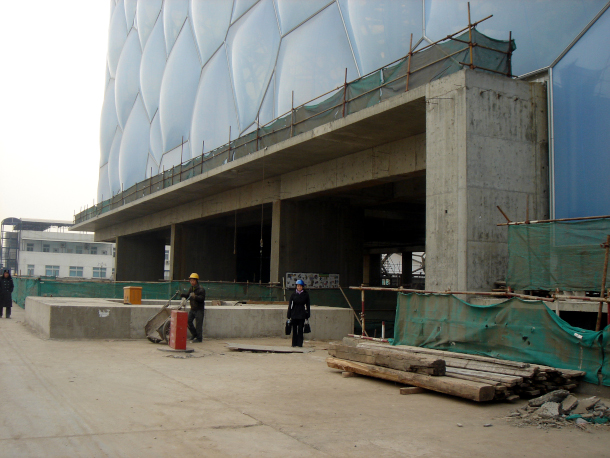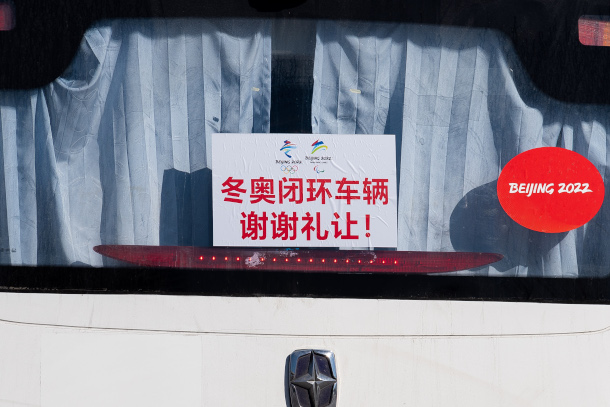Sustainability and the Beijing Olympics
Air Date: Week of February 4, 2022

Construction occurs outside of the Water Cube, one of the six existing venues being reused for the Winter Olympics. (Photo: Xiaming, WordPress, CC-BY-SA 2.0)
The Winter Olympics in Beijing feature covid protocols and new sustainability measures. Natalie Ma, a reporter at the state-owned paper Shanghai Daily, joins Host Steve Curwood to discuss the ways China is cutting carbon emissions at the games, on-the-ground conditions in Beijing, and the games’ future implications for local business owners in Chongli and surrounding regions.
Transcript
BASCOMB: It’s Living on Earth, I’m Bobby Bascomb
CURWOOD: And I’m Steve Curwood.
The winter Olympics are officially underway and millions of people are tuning in to watch skaters, skiers, and sledders go for the gold. This year the games are in and around Beijing, China, where like so many other places on the planet, including past winter game venues, snow for skiing has been hard to come by, thanks to the warmer winters of climate change. China has made efforts to make the Winter Olympic Games more sustainable, though some of the sites have been criticized. Joining us now from Beijing is Natalie Ma. She is a reporter for the state-owned English language paper, Shanghai Daily. Welcome to Living on Earth!
MA: Hi, everybody. Thank you. I'm Natalie Ma, representing Shanghai Daily, and I'm in Beijing right now.
CURWOOD: So what about this Winter Olympics in Beijing makes it different from other ones hosted in previous years, do you think?
MA: Well, I think the key difference is, of course, Beijing held the Summer Olympic Games back in 2008. And now it's holding the Winter edition, so it's become the first city in the world ever to hold both editions of the games. So, to welcome such a grand event, China has sent a largest delegation team ever.
CURWOOD: Of course, one thing about these Olympics is that public attendance is by invitation only because of the virus. I think it's interesting to point out that in the United States, we've had over 800,000 people die from COVID- 19. But the official numbers in China are less than 5000. I think it's 4700 deaths related to the virus. What does that say about the care that the Chinese government is taking during these Olympics to not have spectators?
MA: Well, unfortunately, we have these restrictions due to the COVID-19. I believe everybody from the host country want to watch the games, attending them. And I know some people who have prepared for years for the games like, but they have to give it up. So I believe people are disappointed about it. But also we can understand it, we accept it, and also we find other ways to get involved. And also the phenomenon here is quite warm, I think, especially in the current circumstance, we have something to cheer for together, globally. That's still better than nothing.
CURWOOD: Right. And what do you think of the fact that the United States has had over 800,000 deaths, and China has only had less than 5000 deaths from the virus?

A sign on the back of a bus reads “Olympics Closed Loop Vehicle – Thanks for Making Way!”, while the red dot indicates the bus is a part of the Olympic “bubble”. (Photo: N509FX, Wikimedia Commons, CC BY-SA 4.0)
MA: We have been using pretty strict pandemic prevention measures. Like for example, I arrived in Beijing, and I had to take the acid test within 48 hours before arrival. And after arrive within 48 hours, I had to get another test. And also, you know, the closed loop concept, the athletes, coaches, yes, they are all kind of protected, basically cannot reach out to the outsiders. So this is all for safety concern. Over the past two years, we have all been following all these strict requirements willingly. I can't comment on how you know, the number is so big in the US, I guess it's different management or sort of thinking by the government of the two countries. I can just say that we are following what we believe is right.
CURWOOD: Well, yes, I mean, there certainly is a difference. And if the United States had the same number of people as China, we would have lost 3 million people to the disease. Now, there have been reports recently about the difficulties that Chongli, is that how I pronounce it, faces due to the COVID restrictions. At the same time, there haven't been many government subsidies for Olympics construction. In what ways do you think the Olympics might help stimulate future tourism in these areas that were built up for the Olympics?
MA: I think we can use Chongli itself as example. You know, Chongli used to be one of the poorest districts in China, I think was 16.8% of it's more than 10,000 residents living below the national poverty line. I think that figure I checked, it was by 2015. But now, you know, this mountain town has been transformed into a skiers' paradise. I remember reading a report saying now one in five people from Chongli is employed in the ski resort, or some business related to the Winter Games. So I think that will help the people, in the same time, will boost the local tourism industry.
CURWOOD: So what's the weather for the games looking like right now?
MA: The games will be held in three places: Beijing, Yanqing. And Chongli. And Beijing now highest temperature currently around three or four degrees and the lowest minus eight minus nine degrees centigrade. In Chongli and Yanqing that should be colder because most skiing events are held there. Should be minus 15 degrees centigrade.
China????????, the host country of the XXIV Olympic Winter Games, has entered the stadium. Gao Tingyu and Zhao Dan are the flag bearers!
— Beijing 2022 (@Beijing2022) February 4, 2022
Looking forward to seeing them and all the athletes compete at #Beijing2022!#Olympics #OpeningCeremony#TogetherForASharedFuture
???? GettyImages pic.twitter.com/1eqoEE4aBT
CURWOOD: Now we understand China has invested heavily in the sustainability of the Olympics this time around. Could you speak a little bit about this? I mean, how will these reforms potentially influence the way other cities pursue sustainable reforms in the coming years?
MA: Well, out of the 12 competition venues, six of them already existed, which means a number of venues, they were built for the 2008 Beijing Summer Games. So they are being reused, for example, the bird's nest and the water cube. So that can minimize the cost. So this mix of new and existing venues, it's spread across all the three different competition zones. Secondly, we are using all the low-emission carbon dioxide refrigeration systems at all the ice venues. And that's expected to cut emissions. That's the first time ever a Winter Olympics host country is doing it to all the venues. And as for transportation, we are using clean energy vehicles. So these are the energy saving and clean energy measures. I think for future influence, you know, host countries in the future are already preparing to be committed to it, they will be keenly watching on how Beijing is doing it, and maybe they will be taking notes, you know. So if we can make this into a really good green games, I think people will start to follow up, other host countries, they will try to do the same.
CURWOOD: So just to be clear, you're talking about using carbon dioxide as a refrigerant for keeping ice cold and skating rinks and curling places and such instead of the CFCs, which, of course, are strong greenhouse gases. That's what I'm understanding you're saying,
MA: Or put it this way. It's the first games in history to exclusively power all the venues with clean energy from renewable sources, and use carbon dioxide in ice-making procedures.
CURWOOD: So Natalie, how would you define the success of an event like the Olympics? I mean, in your view, how do you see this event living up to that?
MA: You know, in terms of organization, even the 2008 games is still fresh in everybody's mind. It's like yesterday. First, I think, to successfully host it, especially under the circumstance we are having now under the COVID-19 pandemic, to have it go on smoothly and most importantly, safely. It is our main goal. And also, you know, a lot of people who have been got involved in the 2008 Summer Games have been involved in this winter games too, like the opening and the closing ceremony director, Zhang Yimou, and also a lot of volunteers. So regarding participation, and the enthusiasm from the public, if everybody feel involved and feel proud, then that's a successful Olympics for us. And for the world, of course, if this Olympics can go on smoothly to show the world, we are still encouraging sports, healthy lifestyle, and that's a big success too.
CURWOOD: Tell me about any interesting developments or moments, athletics or otherwise, that we should keep an eye out for.
MA: If you're talking about Chinese, I have to admit that China has never been a very big player in Winter Games. Of course, we have our strong suits, like figure skating, and also short-track speed skating. But now I think there are some fresh young bloods. But also there's one particular name I want to mention, which is Gu Eileen, she is very hopeful to win gold medals in the skiing items.
CURWOOD: Indeed. Natalie Ma is a reporter with Shanghai Daily speaking to us from Beijing. Thanks so much for taking the time with us today.
MA: No problem, Steve. That's my pleasure. Thanks.
CURWOOD: And enjoy the games.
MA: Thank you. I will.
Links
Living on Earth wants to hear from you!
Living on Earth
62 Calef Highway, Suite 212
Lee, NH 03861
Telephone: 617-287-4121
E-mail: comments@loe.org
Newsletter [Click here]
Donate to Living on Earth!
Living on Earth is an independent media program and relies entirely on contributions from listeners and institutions supporting public service. Please donate now to preserve an independent environmental voice.
NewsletterLiving on Earth offers a weekly delivery of the show's rundown to your mailbox. Sign up for our newsletter today!
 Sailors For The Sea: Be the change you want to sea.
Sailors For The Sea: Be the change you want to sea.
 The Grantham Foundation for the Protection of the Environment: Committed to protecting and improving the health of the global environment.
The Grantham Foundation for the Protection of the Environment: Committed to protecting and improving the health of the global environment.
 Contribute to Living on Earth and receive, as our gift to you, an archival print of one of Mark Seth Lender's extraordinary wildlife photographs. Follow the link to see Mark's current collection of photographs.
Contribute to Living on Earth and receive, as our gift to you, an archival print of one of Mark Seth Lender's extraordinary wildlife photographs. Follow the link to see Mark's current collection of photographs.
 Buy a signed copy of Mark Seth Lender's book Smeagull the Seagull & support Living on Earth
Buy a signed copy of Mark Seth Lender's book Smeagull the Seagull & support Living on Earth

